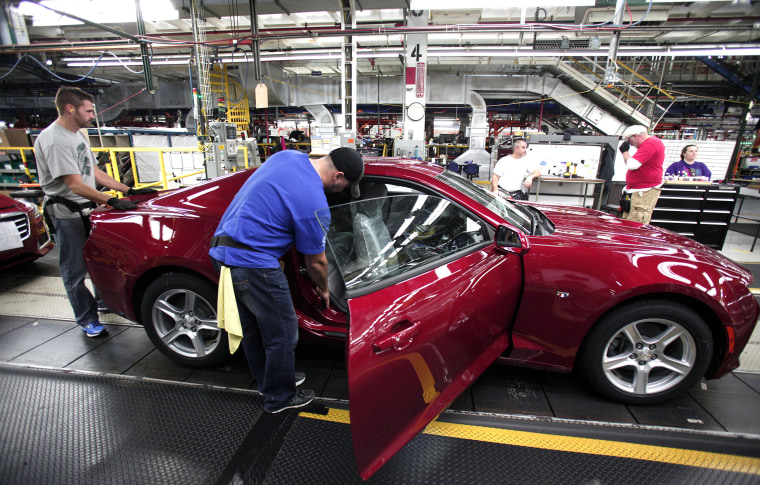President Donald Trump announced a $12 billion aid package to help some of the farmers affected by his tariffs — but what about all the other industries impacted by the global tit for tat over trade deals?
The damage from Trump's tariffs on America's trading partners goes beyond just the price of a glass of milk or bushel of soybeans. Other interconnected sectors can suffer as well, said Paul Bingham, senior transportation and trade consultant for the Economic Development Research Group.
"A United States Department of Agriculture bailout of farmers may temporarily make up for lost farm income, but farmers aren’t going to buy new equipment, or fertilizer, etc. for crops they don’t need to grow since they’ve lost competitiveness to sell the crops in foreign markets," Bingham told NBC News.
Trump announced on Wednesday that the White House was working with the European Union to strike a deal for "zero tariffs," after a meeting with European Commission President Jean-Claude Juncker. But American farmers are still struggling as a result of Trump's 25 percent tariff on $34 billion of Chinese imports, which came into effect earlier this month and caused Beijing to retaliate by slapping dollar-for-dollar tariffs on American exports of soybeans, wheat, cotton, pork, and other products.
The relief package, which is an attempt to offset the $11 billion in losses, is a “one-time” program to buy time while the president negotiations trade deals, a USDA official said.
However, "Farm equipment dealers, farm equipment manufacturers, insurance companies, and the transportation companies that move the equipment and farm supplies and farm products are all losers too — but unlikely to be included in the compensation," said Bingham.
"The agriculture and food sector is more than just the farmers themselves — so offsetting impacts on the economy is more than just paying off farmers directly."
"The agriculture and food sector is more than just the farmers themselves, so offsetting impacts on the economy is more than just paying off farmers directly," he added.
Farm tariffs alone have the potential to hurt companies in a range of industries from agricultural equipment makers to transport to energy, financial, healthcare, mid-size cars and plastics, due to their reliance on imported metals and electronics or are tied directly or indirectly to access to export markets.
Some major companies have already started to downgrade their earnings forecasts due to tariff concerns. Detroit's big three all lowered their outlook for 2018, with GM's stock dropping more than 5 percent Tuesday after it reduced guidance, in part due to the new trade barriers. Ford announced late on Wednesday that it expected tariffs to slice $600 million off its annual profits, and Fiat Chrysler shares fell by 15 percent after its second-quarter earnings report and comments from its new CEO Mike Manley that China was an ongoing challenge.
Last month, German automaker Daimler, parent company of Mercedes-Benz, also reduced its guidance, citing "increased import tariffs." Other manufacturers taking similar steps include steelmaker Alcoa, plus Whirlpool and Valmont, a Nebraska-based metal fabricator.
But in a campaign-style speech on Tuesday to the Veterans of Foreign Wars convention in Kansas City, Missouri, Trump told supporters that his hard-nosed tactics are working, since the targets of his tariffs are now "all coming to see us. And the farmers will be the biggest beneficiary. Watch. We're opening up markets," he said, asking his base to "just be a little patient."
Jeff Schwager, president of the Wisconsin-based cheese-maker Sartori, told NBC News his company has already lost some overseas business due to customers changing vendors to avoid tariff hikes. Even with the new USDA plan, dairy farmers his company buys milk from will be able to sell some of their surplus to the government — but there's no plan in place for cheese.
"$12 billion sounds like a lot of money, but will not go very far to cover losses from the tariff situation if it goes on a long period," Schwager said.
The USDA defended the new relief program for farmers, which allows them to receive assistance under two Depression-era programs that don't require seeking additional Congressional spending approval.
The USDA said the $12 billion in aid "is in line with the estimated $11 billion impact of the unjustified retaliatory tariffs on U.S. agricultural goods."
But that aid won't flow to all industries getting slammed by the tariffs, and not even to all sectors of agriculture. The list, for instance, doesn't include the billion-dollar seafood or poultry industries.
The farming industry itself isn't exactly square dancing about the new plan. In interviews, farmers have said they don't want a handout, they want free markets.
Even some key GOP lawmakers have spoken out against the proposal, with Sen. Rob Portman of Ohio noting that "Farmers like to say 'trade not aid'."
Instead of making America great again, the president’s policies are “going to make it 1929 again," said Sen. Ben Sasse of Nebraska.
